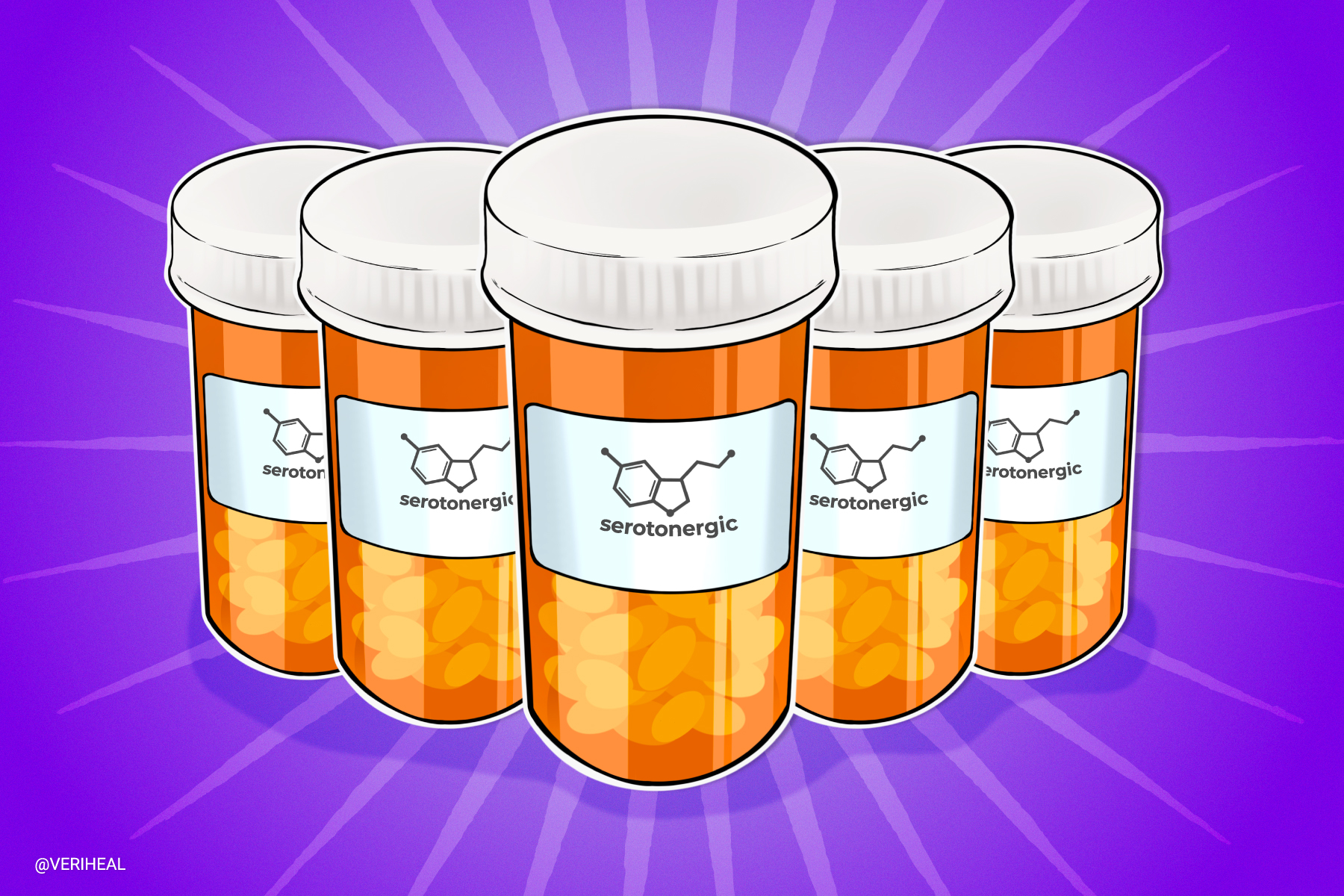“Serotonergic” (serədōˈnərjik) may come off as an intimidating term, but it is actually quite simple when you consider that it has a broad meaning relating to serotonin. However, understanding what this broad term entails is rather important considering the vast influence of this neurotransmitter, which is often referred to as a hormone. In this article, we will be unpacking what it means, the respective medications, and benefits, as well as reactions and risks.
What Does Serotonergic Mean?
The Oxford online dictionary describes serotonergic as “denoting a nerve ending that releases, and is stimulated by serotonin,” while Merriam-Webster defines serotonergic as, “liberating, activated by or involving serotonin in the transmission of nerve impulses.” Together, these definitions provide a good overview—but let’s get a better understanding of what seratonergic means in relation to the human body.
Science Direct explains that “serotonergic neurons account for less than 1% of all the neurons in the brain, yet, there is virtually no corner of the CNS (central nervous system) that is lacking serotonergic input.” Despite accounting for so few of the neurons in the brain and considering the magnitude of its reach through the CNS, it makes sense that “the serotonergic system is well-positioned to provide a broad modulatory influence upon diverse functions rather than the precise point-to-point transmission characteristic of traditional sensory, motor or associational pathways.” Essentially, serotonergic is described as something that mimics serotonin and influences serotonin receptors, which ultimately impacts a multitude of functions in the body.
What Medications Impact Serotonin?
It should be noted that serotonergic medications refer to serotonin-related medications as opposed to medications that contain serotonin. Serotonin cannot be directly obtained from food, and oral serotonin itself can’t cross the brain’s naturally defensive blood-brain barrier. That being said, serotonin-related medications that impact the body’s organic levels of serotonin include, but are not limited to, the following.
Pharmaceuticals:
- Selective serotonin reuptake inhibitors (SSRIs) such as citalopram, fluoxetine, paroxetine, and sertraline
- Serotonin and norepinephrine reuptake inhibitors (SNRIs) such as duloxetine and venlafaxine
- Bupropion
- Tricyclic antidepressants such as nortriptyline and amitriptyline
- Monoamine oxidase inhibitors (MAOIs) such as isocarboxazid and phenelzine
- Anti-migraine medications such as carbamazepine, carbamazepine, sodium valproate, naratriptan, and sumatriptan
- Pain medication such as codeine, fentanyl, hydrocodone, and oxycodone
- Lithium
Many are aware of the aforementioned pharmaceuticals used to treat various illnesses, but did you know that there are psychedelics that are considered to be serotonergic? The chemical structure of these psychedelics closely resembles the structure of serotonin and provides physiological effects.
Classic Psychedelics:
Medical News Today explains that “the relationship between serotonin and many bodily functions remains unclear” but that “doctors may prescribe drugs that regulate serotonin levels to treat a number” of disorders. These disorders include depression, stress, bipolar disorder, PTSD, bulimia, obsessive-compulsive disorder, panic disorder, and migraines. These medications are able to help conditions such as these due to the fact that, for example, the SSRIs “stop the body from reabsorbing serotonin,” therefore blocking the accumulation of serotonin in the body, which can be dangerous.
Low levels of serotonin can also lead to problems such as a low mood and issues with memory. Drugs such as MDMA (ecstasy) induce the release of significant quantities of serotonin at once, which causes a serotonin “crash” afterward. According to this 2009 study, “Serotonin has been implicated in the causation of hallucinations, based on the fact that a number of hallucinogenic drugs, like lysergic acid diethylamide (LSD), mescaline, psilocybin, and ecstasy, appear to act, at least in part, as serotonin.” This suggests that these psychedelics can cause hallucinations due to accumulated serotonin.
What About Serotonergic Hallucinations?
This 2018 study explained that serotonergic hallucinations are “hallucinatory experiences triggered by serotonin” and that they tend to be “dream-like with the experiencer having insight (meta-awareness) that he is hallucinating.” It is this awareness that separates serotonergic hallucinations from dopaminergic hallucinations where the individuals are not aware they are hallucinating. Just like serotonergic hallucinations stem from the overstimulation of the serotonin neurotransmitter, dopaminergic hallucinations stem from the overstimulation of the neurotransmitter known as dopamine.
Both of these neurotransmitters, serotonin, and dopamine, are the “chemical messengers” that play roles “in sleep and memory as well as metabolism and emotional well-being.” These two are also commonly referred to as the “happy hormones” since they play a role in regulating mood and emotion. Despite these similarities, dopamine and serotonin operate differently; when either one’s levels are impacted, they present with different conditions, which then will require their own treatment.
Serotonin Syndrome Is Not Something to Joke About
The Mayo Clinic explains that “excessive accumulation of serotonin in your body creates the symptoms of serotonin syndrome” that can range from mild to life-threatening. Individuals can accumulate serotonin when consuming a serotonergic medication but are more likely to present with symptoms of serotonin syndrome if certain medications and/or substances are combined. As an example of this, “Serotonin syndrome may occur if you take an antidepressant with migraine medication. It may also occur if you take an antidepressant with opioid pain medication.”
The same can be said for those who want to explore psychedelic therapies. According to experts, using psilocybin while on antidepressants can also elevate the risk of serotonin syndrome if not taken properly. While serotonergic medications can help promote a good quality of life, it’s incredibly important to never mix medications or therapeutic substances without speaking with a doctor beforehand to reduce the risk of harm.
Note: Veriheal does not support illegally consuming therapeutic substances such as psychedelics but acknowledges that it transpires because of the current illicit status, which we strive to change by advocating for research, legal access, and responsible consumption. Always consult a physician before attempting alternative therapies.
Author, Share & Comments
















